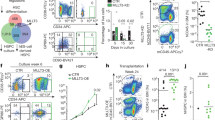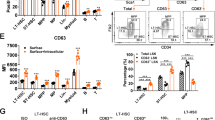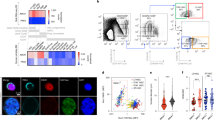Abstract
Self-renewal of stem cells is critical for tissue repair and maintenance of organ integrity in most mammalian systems. The relative asymmetry between self-renewal and differentiation in balance with apoptosis determines the size and durability of a stem-cell pool. Regulation of the cell cycle is one of the fundamental mechanisms underlying determination of cell fate. Absence of p21Cip1/Waf1, a late G1-phase cyclin-dependent kinase inhibitor (CKI), has previously been shown to enable cell-cycle entry of haematopoietic stem cells, but leads to premature exhaustion of the stem cells under conditions of stress. We show here that deletion of an early G1-phase CKI, p18INK4C, results in strikingly improved long-term engraftment, largely by increasing self-renewing divisions of the primitive cells in murine transplant models. Therefore, different CKIs have highly distinct effects on the kinetics of stem cells, possibly because of their active position in the cell cycle, and p18INK4C appears to be a strong inhibitor limiting the potential of stem-cell self-renewal in vivo.
This is a preview of subscription content, access via your institution
Access options
Subscribe to this journal
Receive 12 print issues and online access
$209.00 per year
only $17.42 per issue
Buy this article
- Purchase on Springer Link
- Instant access to full article PDF
Prices may be subject to local taxes which are calculated during checkout




Similar content being viewed by others
References
Sherr, C.J. & Roberts, J.M. CDK inhibitors: positive and negative regulators of G1-phase progression. Genes Dev. 13, 1501–1512 (1999).
Steinman, R.A. Cell cycle regulators and haematopoiesis. Oncogene 21, 3403–3413 (2002).
Conlon, I. & Raff, M. Size control in animal development. Cell 96, 235–244 (1999).
Cunningham, J.J. & Roussel, M.F. Cyclin-dependent kinase inhibitors in the development of the central nervous system. Cell Growth Differ. 12, 387–396 (2001).
Cheng, T. & Scadden, D.T. Cell cycle entry of haematopoietic stem and progenitor cells controlled by distinct cyclin-dependent kinase inhibitors. Int. J. Hematol. 75, 460–465 (2002).
Cheng, T. et al. Haematopoietic stem cell quiescence maintained by p21(cip1/waf1). Science 287, 1804–1808 (2000).
Park, I.K. et al. Bmi-1 is required for maintenance of adult self-renewing haematopoietic stem cells. Nature 423, 302–305 (2003).
Tschan, M.P. et al. The cyclin-dependent kinase inhibitors p18INK4c and p19INK4d are highly expressed in CD34+ progenitor and acute myeloid leukaemic cells but not in normal differentiated myeloid cells. Br. J. Haematol. 106, 644–651 (1999).
Franklin, D.S. et al. CDK inhibitors p18(INK4c) and p27(Kip1) mediate two separate pathways to collaboratively suppress pituitary tumorigenesis. Genes Dev. 12, 2899–2911 (1998).
Franklin, D.S., Godfrey, V.L., O'Brien, D.A., Deng, C. & Xiong, Y. Functional collaboration between different cyclin-dependent kinase inhibitors suppresses tumor growth with distinct tissue specificity. Mol. Cell. Biol. 20, 6147–6158 (2000).
Bai, F., Pei, X.H., Godfrey, V.L. & Xiong, Y. Haploinsufficiency of p18INK4c sensitizes mice to carcinogen-induced tumorigenesis. Mol. Cell. Biol. 23, 1269–1277 (2003).
Harrison, D.E. Competitive repopulation: a new assay for long-term stem cell functional capacity. Blood 55, 77–81 (1980).
Cheng, T., Rodrigues, N., Dombkowski, D., Stier, S. & Scadden, D. Stem cell repopulation efficiency but not pool size is governed by p27. Nature Med. 6, 1235–1240 (2000).
Sutherland, H.J., Lansdorp, P.M., Henkelman, D.H., Eaves, A.C. & Eaves, C.J. Functional characterization of individual human haematopoietic stem cells cultured at limiting dilution on supportive marrow stromal layers. Proc. Natl Acad. Sci. USA 87, 3584–3588 (1990).
Osawa, M. et al. In vivo self-renewal of c-Kit+ Sca-1+ Linlow/- hemopoietic stem cells. J. Immunol. 156, 3207–3214 (1996).
Spangrude, G.J., Heimfeld, S. & Weissman, I.L. Purification and characterization of mouse haematopoietic stem cells. Science 241, 58–62 (1988). [Erratum Science 244, 1030 (1989).]
Harrison, D.E., Astle, C.M. & Delaittre, J.A. Loss of proliferative capacity in immunohemopoietic stem cells caused by serial transplantation rather than aging. J. Exp. Med. 147, 1526–1531 (1978).
Mauch, P. & Hellman, S. Loss of haematopoietic stem cell self-renewal after bone marrow transplantation. Blood 74, 872–875 (1989).
Osawa, M., Hanada, K., Hamada, H. & Nakauchi, H. Long-term lymphohaematopoietic reconstitution by a single CD34-low/negative haematopoietic stem cell. Science 273, 242–245 (1996).
Na Nakorn, T., Traver, D., Weissman, I.L. & Akashi, K. Myeloerythroid-restricted progenitors are sufficient to confer radioprotection and provide the majority of day 8 CFU.-S. J. Clin. Invest. 109, 1579–1585 (2002).
Oostendorp, R.A., Audet, J. & Eaves, C.J. High-resolution tracking of cell division suggests similar cell cycle kinetics of haematopoietic stem cells stimulated in vitro and in vivo. Blood 95, 855–862 (2000).
Krause, D.S. et al. Multi-organ, multi-lineage engraftment by a single bone marrow-derived stem cell. Cell 105, 369–377 (2001).
Phelps, D.E. et al. Coupled transcriptional and translational control of cyclin-dependent kinase inhibitor p18INK4c expression during myogenesis. Mol. Cell. Biol. 18, 2334–2343 (1998).
Pardee, A.B. G1 events and regulation of cell proliferation. Science 246, 603–608 (1989).
Sherr, C.J. The Pezcoller lecture: cancer cell cycles revisited. Cancer Res. 60, 3689–3695 (2000).
Hirai, H., Roussel, M.F., Kato, J.Y., Ashmun, R.A. & Sherr, C.J. Novel INK4 proteins, p19 and p18, are specific inhibitors of the cyclin D-dependent kinases CDK4 and CDK6. Mol. Cell. Biol. 15, 2672–2681 (1995).
Wagers, A.J., Sherwood, R.I., Christensen, J.L. & Weissman, I.L. Little evidence for developmental plasticity of adult haematopoietic stem cells. Science 297, 2256–2259 (2002).
Uchida, N., Dykstra, B., Lyons, K.J., Leung, F.Y. & Eaves, C.J. Different in vivo repopulating activities of purified haematopoietic stem cells before and after being stimulated to divide in vitro with the same kinetics. Exp. Hematol. 31, 1338–1347 (2003).
Szilvassy, S.J.N.F., Eaves, C.J. & Miller, C.L. in Haematopoietic Stem Cell Protocols (ed. Klug, C. A. & Jordan, C. T.) 167–187 (Humana Press, Totowa, NJ, 2002).
Passegue, E., Jamieson, C.H., Ailles, L.E. & Weissman, I.L. Normal and leukemic haematopoiesis: are leukemias a stem cell disorder or a reacquisition of stem cell characteristics? Proc. Natl Acad. Sci. USA 100 (Suppl. 1), 11842–11849 (2003).
Acknowledgements
The authors thank Dr Joel Greenberger and Dr Richard A. Steinman for their suggestions on this manuscript. The authors also thank Ying Shao and Shaonan Cao for their technical assistance, and Matthew Boyer for editing the manuscript. This work was supported by National Institutes of Health grants (DK02761, HL70561), a PTEI technology development grant (T.C.). T.C. was a recipient of the Innovative Award from the PNC Foundation (2002), an Outstanding Overseas Scholar Award from the Chinese Natural Science Foundation (2002), and the Scholar Award from the American Society of Hematology (2003).
Author information
Authors and Affiliations
Corresponding author
Ethics declarations
Competing interests
The authors declare no competing financial interests.
Supplementary information
Supplementary Information, Fig. S1
Supplementary Information, Fig. S2 (PPT 887 kb)
Supplementary Information, Fig. S3
Rights and permissions
About this article
Cite this article
Yuan, Y., Shen, H., Franklin, D. et al. In vivo self-renewing divisions of haematopoietic stem cells are increased in the absence of the early G1-phase inhibitor, p18INK4C. Nat Cell Biol 6, 436–442 (2004). https://doi.org/10.1038/ncb1126
Received:
Accepted:
Published:
Issue Date:
DOI: https://doi.org/10.1038/ncb1126
This article is cited by
-
Bone morphogenetic protein 4 rescues the bone regenerative potential of old muscle-derived stem cells via regulation of cell cycle inhibitors
Stem Cell Research & Therapy (2022)
-
The distinct effects of P18 overexpression on different stages of hematopoiesis involve TGF-β and NF-κB signaling
Scientific Reports (2021)
-
Chromatin remodeler Znhit1 preserves hematopoietic stem cell quiescence by determining the accessibility of distal enhancers
Leukemia (2020)
-
p53 on the crossroad between regeneration and cancer
Cell Death & Differentiation (2017)
-
Repression of CDKN2C caused by PML/RARα binding promotes the proliferation and differentiation block in acute promyelocytic leukemia
Frontiers of Medicine (2016)



